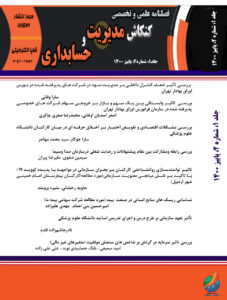مقاله: پژوهشی
صفحه: 103-86
نویسندگان:
جعفرکیالاشکی1، داوودکیاکجوری2، حامد باقری توستانی3
- استادیار گروه مدیریت دولتی، دانشگاه غیرانتفاعی مارلیک، واحد نوشهر، ایران
- دانشیار گروه مدیریت دولتی، دانشگاه غیرانتفاعی مارلیک، واحد نوشهر، ایران
- نویسنده مسئول؛ دانشجوی مدیریت دولتی، دانشگاه غیرانتفاعی مارلیک، واحد نوشهر، ایران
چکیده
در دنیایی که بهشدت پیوسته و دارای ارتباطات قوی بین کشورهاست، اثرات طغیان ویروس کرونا (کووید 19) باعث کند شدن فعالیتهای سازمانها شده است. سازمانها باید در این عرصه هرچه سریعتر خود را انعطاف داده و با شرایط غیرمنتظره پیش رو وفق دهند؛ که یکی از راهحلهای آن خودکارآمدی کارکنان در شرایط دورکاری میباشد؛ بنابراین هدف از این تحقیق، بررسی نقش خودکارآمدی در پذیرش دورکاری کارمندان است. روش تحقیق در این مطالعه توصیفی و پیمایشی بوده و نمونه جامعه آماری با انجام نمونهگیری تصادفی و انتخاب 170 نفر از کارمندان فعال در ادارات کل غرب استان مازندران صورت گرفت. ابزار گردآوری دادهها، پرسشنامه استاندارد بود. روایی پرسشنامهها از طریق تحلیل عاملی تائیدی و پایایی آنها نیز با استفاده از آزمون آلفای کرونباخ مورد تائید قرار گرفت. روش تجزیهوتحلیل دادهها، با استفاده از آمار توصیفی (میانگین، انحراف استاندارد و واریانس) و آمار استنباطی (معادلات ساختاری) به کمک نرمافزارهای SPSS و PLS بود. یافته تحقیق نشان داد که خودکارآمدی کارکنان بر پذیرش دورکاری نقش معناداری دارد؛ باورهای خودکارآمدی فردی و جمعی، انتظار پیامدهای فردی و جمعی در پذیرش دورکاری کارکنان نقش معناداری داشتند نتایج نشان داد امروزه سازمانها خودکارآمدی را بهعنوان ابزار مهمی برای افزایش بهرهوری و زنجیره ارزش سازمان میدانند. خودکارآمدی میتواند در بهبود عملکرد فردی و هم عملکرد سازمانی مؤثر باشد و بنابراین این امر برای متخصصان توسعه منابع انسانی بسیار مهم و ضروری است.
کلمات کلیدی: خودکارآمدی، دورکاری، منابع انسانی.
Investigating the role of self-efficacy in accepting teleworking of employees
Jafar Kialashki1, Davood Kiakjouri2, Hamed Bagheri Tostani3
Assistant Professor, Department of Public Administration, Marlik University, Nowshahr Branch
Assistant Professor, Department of Public Administration, Marlik University, Nowshahr Branch
Author; Student of Public Administration, Marlik University, Nowshahr Branch
Abstract
In a world that is highly connected and has strong connections between countries, the effects of the Corona virus outbreak (Covid 19) have slowed down the activities of organizations. Organizations need to be flexible in this area as soon as possible and adapt to the unexpected conditions ahead; One of the solutions is the self-efficacy of employees in teleworking conditions; Therefore, the purpose of this study is to investigate the role of self-efficacy in accepting telecommuting of employees. The research method in this study was descriptive and survey and the statistical population was sampled by random sampling and selection of 170 active employees in the western departments of Mazandaran province. The data collection tool was a standard questionnaire. The validity of the questionnaires was confirmed by confirmatory factor analysis and their reliability was confirmed by Cronbach’s alpha test. Data were analyzed using descriptive statistics (mean, standard deviation and variance) and inferential statistics (structural equations) using SPSS and PLS software. Findings showed that employee self-efficacy has a significant role on telecommuting acceptance; Beliefs of individual and collective self-efficacy, expectation of individual and collective consequences played a significant role in accepting telecommuting of employees. The results showed that today organizations consider self-efficacy as an important tool to increase productivity and value chain of the organization. Self-efficacy can be effective in improving both individual and organizational performance, and therefore this is very important and necessary for human resource development professionals.
Keywords: self-efficacy, telework, human resources
